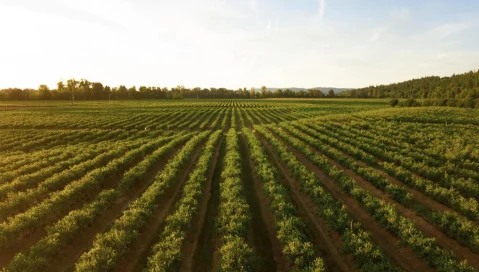En vedette dans cet article
Responsible Sourcing in Food and Beverage: Compelling Reasons and Useful Strategies for Working with Sustainable Suppliers
Responsible Sourcing in Food and Beverage: Compelling Reasons and Useful Strategies for Working with Sustainable Suppliers
25 Janv 2022
John McCurdy
For your food and beverage business to become more sustainable, you have to start at the beginning—the beginning of the supply chain, that is. That’s because responsible sourcing of your ingredients and raw materials is one of the most critical pillars of a solid sustainability initiative.
Your company likely has long-standing relationships with some of your suppliers, which might deter key decision-makers from making the switch to partners with more environmentally friendly operations. But settling for the status quo is unlikely to satisfy the increasing demands of both consumers and regulatory bodies.
For proof that food and beverage organizations are getting serious about sustainability, consider that IDC’s Food and Beverage Global Trends and Strategic Insights whitepaper found that sentiment is shifting such that those who in the past were mere “posters” are becoming true “practitioners” when it comes to eco-friendly measures. Another way of framing it is that “do no harm” is no longer acceptable—now, the expectation is to “do good.”
Let’s dive in to discover both the central reasons for sourcing more responsibly and some strategies your business can consider for making progress toward this worthwhile aim, as well as how technology can help you reach your sustainability goals.
Why Responsible Sourcing Is Important
Motivations both altruistic and financial lie behind the movement toward more sustainable sourcing. Here are three crucial reasons to choose partners that employ responsible methods:
1. Environmental Stewardship
It may surprise you to learn that 35% of manmade greenhouse gas emissions are generated by our food production systems. With climate change and global warming only growing in relevance as extreme weather events occur more frequently, lowering the industry’s collective carbon footprint is of utmost concern.
And beyond that crucial matter, our potable water supplies, wildlife and farmable land are negatively impacted by traditional growing and harvesting methods. Approximately 70% of all water consumed each year goes toward agricultural efforts, and decreasing biodiversity, deforestation and erosion can all be at least partially attributed to unsustainable farming practices.
2. Appeal to Conscious Consumers
Consumers will always care about product quality and price, but today’s shoppers are also keen on knowing that the foods and beverages they buy are produced in environmentally friendly ways. A recent Simon-Kucher & Partners study discovered that 85% of respondents have already started to shift their purchase behaviors toward more sustainable options.
This means that sourcing responsibly—and communicating your efforts on this front transparently—can be a key differentiator for your offerings when compared to alternatives on the shelf. That, in turn, will lead to better profitability, which will help your bottom line but also provide the means to fuel additional sustainability measures in your supply chain and at your facilities.
3. Align with Regulations
Your business obviously can’t control the compliance efforts of your suppliers, but you can choose to work with only those companies that can demonstrate they are operating within all environmental regulations and guidelines. Your brand’s reputation can be severely damaged by choosing the wrong partners, so your due diligence is necessary.
In the U.S., where the Environmental Protection Agency leads the way in establishing and enforcing these laws, everything from stormwater management to pesticide usage need to be scrutinized to fully understand an organization’s sustainability. Meanwhile, the European Union has their own comprehensive body of environmental policies and regulations that apply across all industries.
of consumers have already started to shift their purchase behaviors toward more sustainable options
How to Source Materials More Responsibly
Completely reconfiguring your supply chains to work with more sustainable providers may seem like a daunting task. These three general recommendations should simplify the matter and help you move in the right direction:
1. Favor Organic and Regenerative Approaches
Organic and regenerative agriculture have fewer negative impacts on the environment thanks to their lack of synthetic pesticides and fertilizers and optimized land usage that focuses on the long-term viability of soil. Suppliers that adhere to these methods therefore make attractive potential partners if your organization wants to source more sustainably.
A good example of a success story in the world of organic production is Organic Valley, a brand specializing in dairy and fresh produce with a long track record of accountability and stewardship. In fact, the USDA based their organic standards in part on the company’s standards, which is a testament to their excellent execution on the mission.
2. Work with Local Providers
When there’s less ground to cover between the source and the destination, consumption of fossil fuels in transport is reduced, which leads to a reduction in greenhouse gas emissions and a smaller carbon footprint. Partnering with local farmers also helps build community and fosters a sense of collaboration, both of which can be key in keeping sustainability initiatives successful in the long-term.
Big box giant Walmart has increased their effort on this front, as they’re following up their 2013 commitment of $250 billion toward local sourcing to $350 billion over the next decade. That’s a substantial outlay of financial resources, even for a corporation that large, and demonstrates that even the most established of businesses can adjust to become more responsible.
3. Give Back to Your Communities
Working with individual farmers and smaller co-ops, especially those that operate in underprivileged areas, is a way of investing in the well-being of those communities that power your success through the materials they supply. The act of giving back to the individuals and regions that produce your ingredients is a less visible but nonetheless vital part of ethic and responsible sourcing.
Nestlé is particularly notable here, as their Farmer Connect program entails relationships with more than 550,000 farmers that provide their coffee, cocoa and milk. The brand also maps out supply chains in more at-risk areas and works with environmental organizations ProForest and Earthworm Foundation to ensure that the procurement of their 14 raw materials is as sustainable as possible.
Where Enterprise Resource Planning Software Comes In
An overhaul of your sourcing plans in order to be a more environmentally responsible organization can seem like a complicated, costly and time-intensive step to take. While there will no doubt be resources required on the part of your business, technological solutions that can facilitate the process are here in the form of enterprise resource planning (ERP) systems.
The first and most significant way that an industry-specific ERP can ease the process of introducing more sustainable suppliers is through versatile supply chain management features, which make working with new partners much easier to accomplish while still maintaining complete bidirectional tracking and tracing. The level of visibility on the interface makes communicating your efforts to consumers and government agencies easier as well, as the relevant facts and figures are accessible with just a few clicks or taps.
The robust financial and analytical tools of ERP platforms also help your teams understand what effects your changes in sourcing are having on profitability, product popularity and efficiency, allowing you to tweak your approach to optimize results. The best offerings on the market—such as Aptean Food & Beverage ERP—pack serious power when it comes to crunching the numbers and providing actionable insights.
With the right digital foundation, your food and beverage company can be part of the sustainability movement in the industry. If you’re ready to learn more about the potential impact of Aptean Food & Beverage ERP at your organization, contact us today.
These 10 clients from across various food and beverage sectors achieved more with our solution.



